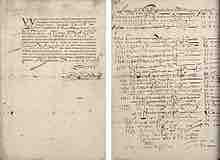Preferred stock usually carries no voting rights, but may carry a dividend and may have priority over common stock in the payment of dividends and upon liquidation. Terms of the preferred stock are stated in a "Certificate of Designation. "

VOC stock
Preferred stock is a security ( a little more modern that this stock from the VOC or Dutch East India Company) that carries certain rights which designate it from common stock or debt.
Preferred stock is a special class of shares that may have any combination of features not possessed by common stock. The following features are usually associated with preferred stock: Preference in dividends preference in assets, in the event of liquidation, convertibility to common stock, callability, and at the option of the corporation. Some preferred shares have special voting rights to approve extraordinary events (such as the issuance of new shares or approval of the acquisition of a company) or to elect directors, but, once again, most preferred shares have no voting rights associated with them. Some preferred shares gain voting rights when the preferred dividends are in arrears for a substantial time.
Preferred stock may or may not have a fixed liquidation value (or par value) associated with it. This represents the amount of capital which was contributed to the corporation when the shares were first issued. Preferred stock has a claim on liquidation proceeds of a stock corporation equal to its par (or liquidation) value, unless otherwise negotiated. This claim is senior to that of common stock, which has only a residual claim.Almost all preferred shares have a negotiated, fixed-dividend amount. The dividend is usually specified as a percentage of the par value, or as a fixed amount. Sometimes, dividends on preferred shares may be negotiated as floating; they may change according to a benchmark interest-rate index. Preferred stock may also have rights to cumulative dividends.